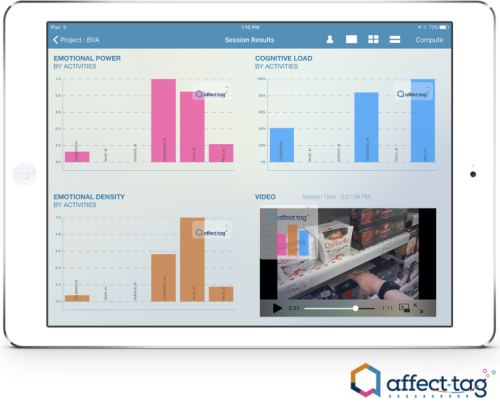(Image: Feel wristband from Sentio Solutions.)
Jawbone, maker of a fitness tracking wristband, has crashed, and rival Fitbit is struggling, with current market valuation one-ninth its July 2015 peak. Fitbit will restructure and pivot, “positioning the company for the next stage of growth within wearables and connected health,” per co-founder and CEO James Park, and reports are that Jawbone will also move into health-related products.
The wristband early-entrant pivots indicate market opportunity for new players, for products designed for the health market. Three notable wristband startups target that opportunity, in particular, analysis of “affective states.” Affect-Tag and Feel measure physiological signals to derive emotion insights for health, marketing, and other applications, and Empatica’s devices predict seizures. Let’s take a look.

Affect-Tag commercializes work done at several French research centers. Wristband sensors measure bio signals and motion; analytical software applies machine learning to extract/infer emotional activity, intensity, and cognitive load, essentially a measure of focus and distraction. A dashboard interface links data to the subjects’ experiences during the measurement interval.
Affect-Tag founder and CEO Olivier Janin sees video-game platforms as a ready-to-adopt market. The thought is that providers would seek to measure physiological states and emotion during game play. He also sees demand for measurement during shopping experiences. While the company has worked with eye tracking, a method designed to measure attention, Affect-Tag generally stays away from similar methods such as facial coding and neuro measurement (fMRI, EEG) and reliance on video. Unlike these methods, a wristband is less invasive and doesn’t require a controlled setting. Subjects forget they’re wearing a band, and measurements aren’t limited to artificial, short-duration, lab-like study sessions.
Empatica similarly produces devices that monitor physiological signals – blood volume and heart rate; skin temperature; electrodermal activity related to stress, engagement, and excitement; and motion-based activity – in real-time, primarily for medical uses. Empatica’s roadmap for the Embrace watch, brought to market in March 2016 after a couple of years of crowd-funded development, is “providing world’s best seizure detection, intuitive interactions with your caregivers, and eventually the ability to forecast seizures.” Empatica also markets the researcher-targeted E4 wristband, available since 2014.

MIT scientist Rosalind Picard is Empatica founder and chief scientist and also co-founded Affectiva, which decodes emotion from facial expressions captured in recorded and live video. (I recruited Picard to keynote at 2014 Sentiment Analysis Symposium, a conference I organize. Jennifer Dutcher wrote a nice recap for datascience@berkeley.)
Affect-Tag, Affectiva: Both names derive from affective computing, a field Picard pioneered as founder and director of the Affective Computing Research Group at the MIT Media Lab. Picard defines affective as computing that “relates to, arises from, or deliberately influences emotion or other affective phenomena.” Sentiment analysis including emotion AI is an affective computing subspecies, applying a diverse collection of methods that include natural language processing (NLP) applied to both written text and spoken language, in addition to physiological monitoring, facial-expression analysis, and neuro methods. Each method has advantages; for instance, text analysis of reviews, survey responses, and social postings can exposes the cause or subject of an emotional reaction, where other measurement methods can only infer root causes by looking for event-reaction correlations.
Affect-Tag and Empatica and others like them – such as the Moodmetric ring and app, “the simplest solution to measure stress and recovery,” and Feel, a wristband that “recognizes and tracks your emotions throughout the day and provides you with personalized coaching to help you achieve your emotional well-being goals” – should appeal to the quantified-self crowd and to those inclined to look to technology to help them manage their actions and reactions to reduce stress and improve their emotional well-being.

Feel is a product of Palo Alto startup Sentio Solutions. The device is still a prototype, and I’ll remark that plans are very, very ambitious: “Feel is designed to track your emotions at all times, using advanced technology – such as speech recognition algorithms, machine vision techniques, and physiological condition monitoring tools – in order to give you personalized tips on how to lower stress levels and feel happier.”
I don’t know what approaches Feel will apply beyond the three sophisticated “such as” technologies – and Feel promises prescriptive analytics and not just measurement – but I’ll guarantee Sentio Solutions won’t pull it off with their current $550k in funding. According to a company representative, “we are closing our seed stage funding, and we are seeking to raise $400K. Moreover, our team is working on our beta prototype to bring Feel to market in the first quarter of 2018.”
There is investment money for this type of device. Jawbone took in $590.8 million before crashing. (Some suggest overfunding led to Jawbone’s demise.) Fitbit’s take totaled $66 million and $FIT’s market valuation peaked at nearly $11 billion.
Empatica funding to date totals $7.78 million; the company took a $5 million Series A in December, 2016. Affect-Tag is looking to raise $750 thousand and, as mentioned, Feel-maker Sentio Solutions is seeking to raiser $400 thousand. Those latter are very modest amounts given the technology’s potential. The emotion-analysis use cases – and Empatica’s aim to predict seizures and with other applications surely planned – are compelling. I expect a Round Two wristband-tech focus on health will succeed where a first-round focus on fitness has floundered.
